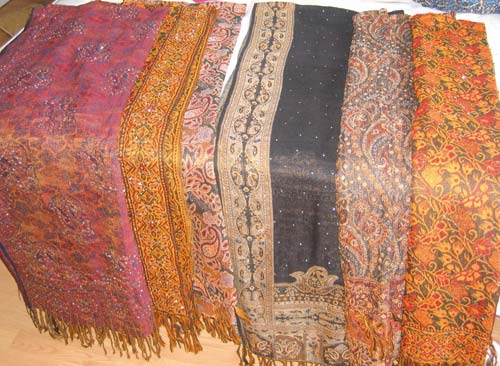Low quality machine made shawls from Punjab and other states, sold in the name of Kashmir brand are hurting Kashmir’s handicrafts besides rendering many local artisans jobless. Aliya Bashir reports.
Kashmiri handicrafts, famous for intricate art and quality is facing serious threat from fake or substandard,

mostly machine-made, lookalikes. Handicraft traders say that a deep-rooted nexus is out to malign the brand Kashmir. Even the high end Pashmina shawl, Kani shawl, Raffal shawl, carpets and papier machie are not safe from the fake trade.
Cheap shawls and carpets produced in power-looms and other factories in Punjab and other states outside Kashmir, are being sold as Kashmir handicrafts to unsuspecting customers throughout India.
Rouf Ahmed Punjabi, former president, Kashmir Chamber of Commerce and Industries holds Kashmiri traders selling outside product in the name of Kashmir, responsible for maligning Kashmir handicrafts. “Traders are selling machine made Amritsar shawls and passing them off as handmade pashmina shawls,” Punjabi said. “Everybody is trying to make a quick buck so a lot of people indulge in fake handicrafts business.”
Rouf says that a pashmina shawl used to be a ‘generational asset’, which mothers would pass on to their daughters. However, the deterioration in its quality, design and pattern makes it loose durability and value. “A woman would purchase a pashmina shawl on her marriage and she used to pass it to her daughter and in the same way the circle used to go on. But, nothing of that sort happens now,” he said.
Other than fake handicrafts, banning the use of Shahtoosh wool by central government, also hit the artisan community and handicrafts trade in the region.
Use of Shahtoosh was banned as poaching of the Tibetan antelope commonly known as Chiru, had endangered it.
Rouf says, “There should have been some replacement instead of completely banning the trade which hit the livelihood of many artisans and the people affiliated with it.”
Besides pashmina shawls the menace of fake handicrafts has hit Kashmir’s carpet industry as many unscrupulous traders use artificial silk in carpets. “A few years back the carpet industry in Kashmir was booming. But, from last five-six years, the exports and profits have gone down due to bad quality and texture of carpets,” Rouf said.
Mushtaq Ahmed, a local shawl trader blames the traders for “mixing of synthetic fibre with Pashmina”. “The duplicate shawl is sold as Kashmir brand which gives a trader unexpected profits. But, as the shawl starts losing its lustre after one wash, it results in bad name to the product and to its manufacturing place,” he said.
Mushtaq says that the wide-scale sale of fake handicrafts has rendered many artisans in Kashmir jobless, as machine made shawls are much cheaper to handmade ones and can be produced more quickly.
Reyaz Kawoosa, Publicity & Exhibition officer, J&K Handicrafts says that the department is taking all measures to check the menace of fake handicrafts in Jammu and Kashmir.
He said that under Tourist Trade Act, 1978 it is mandatory for every shopkeeper to sell labelled items which should differentiate hand made products of Kashmir from those made outside by machines.
“In Kashmir division, we have collected around 70000 rupees as fine in last few weeks and around 15000 rupees from Jammu during the same period from traders selling shawls and other handicrafts without proper labelling,” Reyaz said.
The department has a grievance cell which looks into the complaints and problems related to handicrafts. The department also runs publicity campaigns to “sustain the handicrafts markets outside the state”.
Director, Craft Development Institute (CDI), M S Farooqi says that to ward off the menace of fake pashmina shawls, they have secured a GI patent for handicrafts of Kashmiri origin.
“Under the Geographical Indications (GI) of goods patent, Kashmiri pashmina shawl has its own distinctive logo. In August 2008, Chennai based G1 registry awarded community ownership to Kashmiri Pashmina, Sozni and Kani shawls,” he said.
The CDI is an autonomous body set up by the Centre and Jammu and Kashmir government to promote handicrafts in the state.
The patent came after an agreement between CDI and the Tahafuz, a society of diverse Kashmiri handicraft artisans, Kashmir Handmade Pashmina Promotion Trust (KHPPT) and Wildlife Trust of India (WTI), on September 12, brokered by the Union Minister of State for Commerce Jairam Ramesh.
Farooqi said that the CDI Srinagar has mooted a 10 crore testing laboratory facility to identify original Kashmir Pashmina and tagging it with radio frequency identification (RFID) chip. The chip can be used in coding of information about the manufacturing source and product specifications.
“For the convenience of a customer, he can read the tag and send the information to a centralized station for the validation process. It is purely done to put a halt to the sale of fake shawls,” he said.
“We have to think beyond small term goals. If the government has failed to deliver, it doesn’t mean we have to act as mute spectators. The CDI and various businessmen have already initiated the project of stamping and fake detection facility,” Farooqi added.













